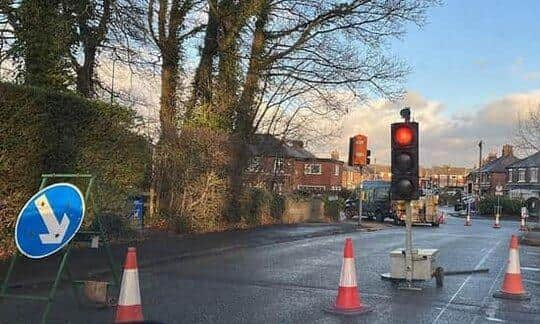Lancashire's roadworks 'explosion': huge rise in routes being dug up, with hundreds of jobs overrunning
and live on Freeview channel 276
In April 2022, Lancashire County Council processed 4,000 requests for the permits required by the likes of water, energy and telecoms firms to dig up the roads and pavements in the authority’s patch.
By April this year, that figure had ballooned to 7,000 - a rise that the cabinet member for highways and transport, Rupert Swarbrick, described as “unprecedented”. He was speaking during the most recent meeting of the full council, at which the details emerged.
Advertisement
Hide AdAdvertisement
Hide AdSeparately, the Local Democracy Reporting Service (LDRS) has learned that County Hall receives around 2,000 temporary road closure requests for both planned and emergency work every year.


Last year, the county council - which is responsible for almost all non-motorway routes in Lancashire except in the Blackpool and Blackburn areas - also handed out more than £1m in road-related fines to utility firms.
The majority of that total - £855,000 - was for roadworks which overran beyond their agreed duration. The authority used its powers under nationwide legislation on 557 occasions during the 2022/23 financial year.
There were also 1,424 instances when it issued fixed penalty notices - totalling around £193,000 - to companies that failed to comply with the terms of the permits that they had been issued for carrying out their works, such as a requirement to manually operate temporary traffic lights or use ‘Stop-Go’ boards to control traffic.
Advertisement
Hide AdAdvertisement
Hide AdUnlike for pre-planned roadworks, utility companies do not require a permit upfront before beginning emergency or urgent activity on the highway.


County Cllr Swarbrick told the meeting: “Very often, we will get retrospective notice [of work] and, at that point, all we can do is to ensure their site is compliant.
“The type and set-up of traffic management, including temporary traffic signals and road closures used at streetworks, is set out in a statutory national code of practice.
“Lancashire County Council officers can and do put conditions on certain aspects of the traffic management. If a utility company does not comply, we can and do issue them with fixed penalty notices,” County Cllr Swarbrick explained.
Advertisement
Hide AdAdvertisement
Hide AdHe said that a forum that allowed County Hall and utilities firms to co-ordinate routine works in order to “minimise disruption” worked well.
The cabinet member also paid tribute to the authority’s “formidable” highways regulation team leader, who has clocked up nearly 40 years’ service with the authority in different roles and whom he said would be “fighting for the residents of Lancashire” until her final day in the job.
The roadworks issue was highlighted at the meeting as a result of a question from Mid Rossendale division member Sean Serridge, who told the LDRS that it had been sparked by the sheer number of temporary lights that had sprung up in his borough, causing "absolute chaos".